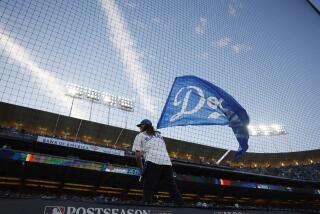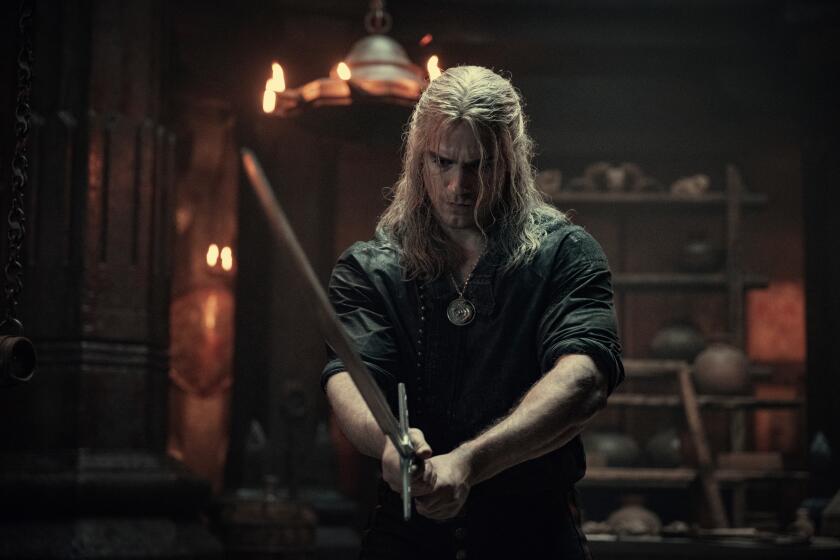Word Play: Louis Sachar’s card-playing obsession
Isn’t it thrilling when your favorite author writes a novel about his secret passion?
Louis Sachar, author of the children’s classic “Holes,” among many other beloved books, now brings us a novel about …playing cards. Playing bridge, to be specific. It turns out he’s a complete bridge freak.
Bo-ring!
You can imagine the first conversation he had with his agent about this novel: “But kids love my books! They’ll be with me every step of the way!”
No, I’m sure he never said that. One of the great things about Sachar’s writing is his modesty. Don’t imagine for a moment that he didn’t consider the difficulty of making this subject gripping to 14-year-olds. He pretty much admits this in “The Cardturner” (Delacorte: $17.99, ages 12 and up) when he has the narrator’s best friend, Cliff, say that “bridge was a card game little old ladies played while eating chocolate-covered raisins.”
Alton Richards is a high school student faced with a bad summer. He has to get a job, but he’s daunted by the prospect of visiting all those dull places and filling out all those dull applications. His girlfriend has left him, and she didn’t just break up with him; she kind of sidled off with his best friend, the aforementioned Cliff. While Alton spends a lot of time brooding over it, he never quite knows what he was supposed to say about it and mostly spends time trying to stay friends with Cliff while avoiding Katie.
Then his mother signs him up to drive his blind great-uncle to his bridge club, hoping the rich old man will solve the family’s money troubles. “Tell him he’s your favorite uncle!” she hisses at Alton when he’s talking to Uncle Lester on the phone.
It doesn’t look like a promising story.
But of course, this being Louis Sachar in the driver’s seat, he gets you. First of all, there’s the modesty: In case you don’t want to learn every little thing about bridge, he signals when he’s about to go into a long, technical explanation by slipping in a little picture of a whale. This is a reference to “Moby Dick” and its passages about whaling, which many readers skip, while the cool readers know that’s where the meat really is. (OK, modesty is a two-edged sword, one side being the blade that disarms you with the aw-shucks cut, the other being the one that bears down on you whistling, “I’m really like the genius Herman Melville!” At another time, we could do a whole essay on modesty and vanity.)
“If I were a super-talented author,” Sachar writes, “you’d no doubt feel the suspense as I described the evening session to you, hand after hand, card after card. When I got to the part where Trapp and Gloria were playing against the pair with the 66 percent game, the tension would be so great, wax would ooze out your ears, no matter how many tiny hairs you have in there. But I’m not.”
Trust me, though, by Page 254, when he’s describing the feeling in the room in which the national bridge championship is being held, it’s electric. You could be at Game 7 of the World Series. You’ll be avidly devouring the whale parts as well as the quick summaries he puts in boxes to make you laugh. You’ll be feeling pretty smart, and you’ll be thinking: “I wonder if I could learn to play bridge, without my friends finding out and thinking I’m a dork.”
Bridge sounds amazingly cool. The more Alton learns about the game, the more he thinks Trapp — which is what he quickly starts calling his Uncle Lester — is the most awesome dude on Earth. The intense relationship between bridge partners, the unbelievable high they get from communicating silently and solving difficult puzzles; no wonder all those old people blow through marriages but hang on to bridge partners. That’s where the juice is!
Then, in another Sachar touch, the really cool stuff just sneaks up on you. Suddenly, on Page 236, you, the reader, wake up like Dorothy with Toto in your arms, and realize you’re not in Kansas anymore. The story has taken a bizarre turn — let me just say ghosts might be involved — and you remember why “Holes” was not just a novel about loser kids in a dusty work camp.
One of the great moments in life is when you discover that you’re not the first person ever to experience the big things — heartbreak, for example. In fact, like the two-edged sword of modesty, experiencing the misery of heartbreak actually puts you, thrillingly, in a line with all the greats who’ve been there before, maybe even starting with your great-uncle.
Word Play appears monthly at https://www.latimes.com/books.
More to Read
The biggest entertainment stories
Get our big stories about Hollywood, film, television, music, arts, culture and more right in your inbox as soon as they publish.
You may occasionally receive promotional content from the Los Angeles Times.






